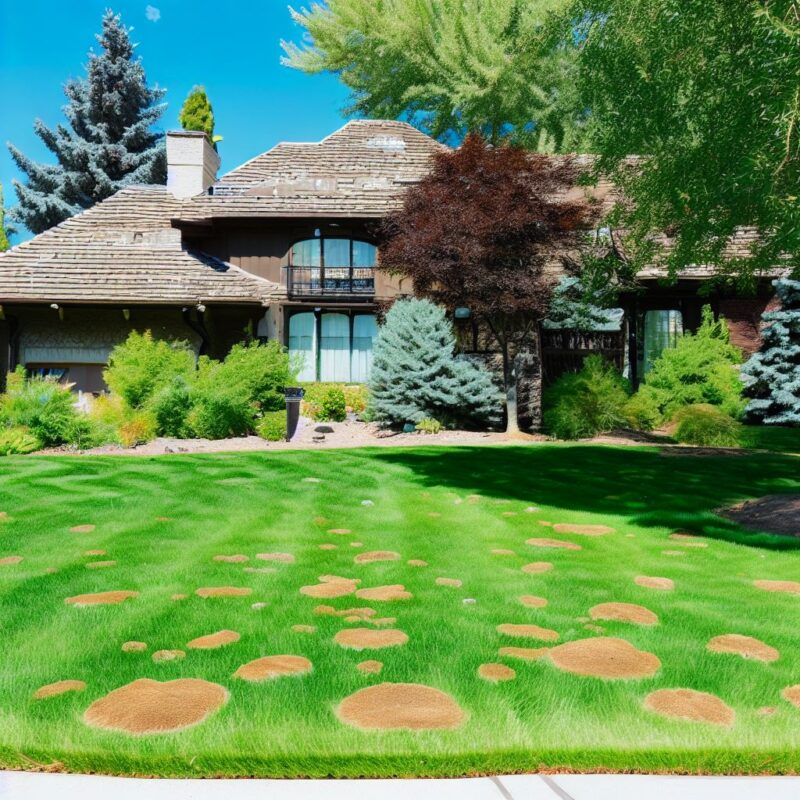Lawn Fungus Control in Denver & Lakewood
Contact us today for your free quote:
Phone: 303-800-8263 | Email:service@wsgrounds.com | Online Contact Form

Maintenance of your lawn can be challenging. You need to control weeds, plant seeds, and fertilize the soil. And even if you do this perfectly, there’s still something else that can damage your lawn: fungi can spread fast with little to no effort if conditions are favorable for their growth. Soon, your fungal infestation can get out of control.
When this happens, you need fungus control solutions. At Westside Grounds, we offer fungus control for lawns. Our Denver & Lakewood lawn fungus control experts will provide you with superior service.
We will identify the species of fungus, develop a treatment plan, and apply the treatment to the fungus. We aim to eradicate any fungus invaders and prevent them from growing back. If you think your lawn has been infected with a fungus, contact Westside Grounds now and let us help your lawn.
What Types of Fungus Are Common on Lawns?
Different types of fungus can infect your house’s lawn. The following are fungi that commonly invade the lawns of Colorado residents.
Necrotic Ring Spot
Necrotic ring spot is a fungal disease that can destroy your picturesque lawn. It is caused by a fungus called Ophiosphaerella korrae. It infects the root of the grass. It is noticeable by its ring-shaped patches.
The ring is a bronze color, while the grass remains healthy and green on the inside. Later, the bronze grass turns into straw-colored grass. This fungus infects during the spring and fall because the temperatures are cooler. It commonly infects Kentucky bluegrass.
Leaf Blight
Leaf blight is a fungal disease caused by the fungus Ascochyta. It invades lawns during the late spring and early summer months. It can grow and spread throughout the lawn very quickly.
A lawn infected by Ascochyta may appear brown, like in a drought. Patches of the lawn turn brown and look as if they are dead. The middle of the grass blades are brownish, as if dead. However, the root and top of the blade usually remain green.
Snow Mold
Two types of fungi can cause snow mold: Typhula incarnata or Microdochium nivale. You can see evidence of snow mold by looking for circular, matted patches with a gray or white-pink color. Snow mold grows when temperatures are around freezing. Snow mold dissipates once temperatures rise.
What Causes Fungi to Grow on Lawn?
Fungi take hold of lawns when conditions for growth are favorable. The primary catalyst for fungal growth is moisture. A moist environment allows fungi to grow. Lawns that lack proper drainage are most susceptible to a fungal infestation. Without adequate drainage, moisture will build up in your lawn. This moisture allows for fungus to grow and infect the lawn.
Also, different species of fungus tend to grow at certain times of the year. You can develop plans for your lawn to prevent fungal growth from happening. Preventing fungus growth will save you time and money later. And it’ll save your lawn, too.
Will Fungus Control Work?
Yes. We will tailor a fungus control plan to your specific situation. The timing of fungal treatment is essential. Fungus grows quickly and can spread easily to your entire landscaping. That’s why we recommend contacting fungus control specialists at the first sight of suspected fungus. That way, we can start treating your lawn immediately to stop the fungus and minimize the damage to your lawn.
When Will My Lawn Return to Normal?
We know you want your beautiful lawn back right away. You worked hard on it and want to show it off. Know that fungus control products do not cure the infected grass. They stop the fungus from spreading and wreaking more havoc on your lawn. This may take time, possibly a week or so. It depends on the fungus type and its prevalence on your lawn.
But while the fungus control products stop the fungus, the infected law won’t turn green again right away. You need to treat your lawn and make it beautiful again. This means you need to aerate your lawn and overseed the areas destroyed by the fungus. This may take some time if the fungus severely damaged your lawn.
Will the Fungus Come Back?
Sometimes, one fungus control visit is enough. Other times, you may need more than one treatment. Every case is different. It depends on how strong the fungus outbreak is and whether weather conditions are conducive to growth.
Sometimes, fungus control services need to be done every few months. Our professional fungus control specialists will assess your situation and develop an effective fungus treatment plan for your lawn.
Fungus Control Near Me
At Westside Grounds, we have two decades of experience in lawn care in the Denver and Lakewood areas. Our fungus control experts have the skills and resources to free your lawn of stubborn fungus. Contact us at Westside Grounds today and learn how we can help you get your lawn green and healthy again.
Trustindex verifies that the original source of the review is Google. Regarding the negative reviewer's comment about calling for snow removal based on a forecast of snow: better to plan further ahead.Trustindex verifies that the original source of the review is Google. I had some trees that were leaning after hard winds and Westside came out and straightened them up and now, six mon hits, later the trees still look great! Thank you WSG!Trustindex verifies that the original source of the review is Google. Great company, does Amazing work! Ain’t cheep but good work ain’t cheep and cheep work ain’t good😊 highly recommend!!
